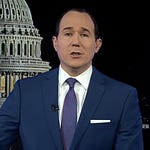Episode Summary
Podcasts are an increasingly important part of many Americans news and entertainment options. There are thousands of them and many of them feature guests like this one, but some of them don’t.
The political dynamic of podcast guests is interesting also because it appears that people who hail from the center-left side of the aisle are less likely to be prolific podcast guests than those who hail from the rightward side of the political spectrum.
The Pew Research Center is doing a lot of interesting analysis on podcasts of late, and I wanted to bring in one of their analysts, Galen Stocking, to discuss his very interesting study about podcast guests. The findings are notable in what they can tell us about the podcast ecosystem, and also how the center used artificial intelligence to conduct the research.
The transcript of audio is below. Because of its length, some podcast apps and email programs may truncate it. Access the episode page to get the full text. The video of this episode is also available.
Related Content
Podcasts are increasingly popular, why do people listen to them?
Why many podcasts and streamers who target male audiences aren’t helping their fans
Fox and CNN are having very different identity crises
Social media moderation standards are more about epistemology than technology
Audio Chapters
00:00 — Introduction
07:24 — Many podcasts with guests routinely featured the same guests, especially ones affiliated with the Daily Wire
14:33 — How Pew used AI to study podcast guests
20:53 — Republican podcast listeners significantly trust their shows much more than Democratic podcast listeners
25:35 — Breaking down the demographics of specific podcast formats
29:22 — Trial and error with AI for podcast transcript analysis
Audio Transcript
The following is a machine-generated transcript of the audio that has not been proofed. It is provided for convenience purposes only.
MATTHEW SHEFFIELD: There are a lot of data points in the research that you guys have been doing, both on the current study, and also in the larger context. So let's maybe start off to set the table with some of the larger context how popular are podcasts [00:02:00] and among other media sources in the research you guys have done?
GALEN STOCKING: Podcasts are incredibly popular. There's been a number of different research studies looking at this and. If we look at the longtime horizon there's some research from Edison Research on Triton, Triton Digital that SE shows that from 2013 to 2023 there was an increase of from 12% to 42% of Americans ages 12 and older who said they'd listened to a podcast in the past month.
So that's phenomenal growth. We also ask people in 2022 if they, I'm sorry, 2023, listen to podcasts in the last year and 49 percent of us adults said they had. So a very wide base of people who use podcasts in general and listen to them.
SHEFFIELD: Yeah. And what about the age range here? Is it how does that compare to other media?
STOCKING: That's a great question. Actually it is, it does tend to be [00:03:00] more popular among younger Americans. So two thirds of Americans ages 18 to 29 say they've used a podcast or listened to podcasts in the last year that compares to 28 percent of those 65 and up. And Other groups are somewhere in the middle, but that does suggest that it even among older Americans podcasts have a foothold and people are listening to them.
SHEFFIELD: Yeah, and it's also the case that you know this sometimes with some technologies there tend to be some gender differences, but it's not as much with regard to podcasts, isn't that right?
STOCKING: No, not a lot of gender differences and also really interestingly no partisan differences really.
There's a 46 percent of Republicans or independently Republican say that they listened to a podcast in last year and 54 percent of Democrats say the same thing. So it's, that's pretty close about roughly half of people from both parties.
SHEFFIELD: Yeah. Yeah. Okay. And then now in [00:04:00] terms of the research that Pew has been doing with looking at podcasts you guys break them down into different categories and, and that's pertinent to the further analysis that we'll be talking about.
So, can you kind of just overview what those categories are? You do note that there are some differences in terms of guests, like, which shows do not have guests such as true crime et cetera. So in other words, sports, self-help relationship, entertainment, et cetera.
STOCKING: So we, we looked at 434 of what we're calling top rank podcasts. Those are podcasts that charted regularly in the top 200 on either Spotify or Apple in a six-month period in 2000 22. And we took those podcasts, we looked at their episode descriptions and determined which podcasts had guests.
And we found that overall three quarters of podcasts had guests at some point during all of 2022 and then another 28 percent or [00:05:00] so had guests at least half the time or more than 4 percent had, I guess, basically in every episode, but there are some differences in terms of the types of podcasts in terms of the areas that each podcast focused on. You look at sports podcasts. All sports podcasts had a guest on it, at least one episode. It's just a matter of how sports podcasts, at least among the top ranked podcasts tend to operate. They have guests on Entertainment podcasts also pretty high 85 percent.
Politics was also pretty high, 78 percent. You contrast that with true crime podcasts which dropped down to 56 percent of those had guests on at least, in at least one episode. And so, and only five percent of them regularly had, had guests on. So, there's some just differences based on topics, just rounds it in what they're actually looking at in the podcast.
SHEFFIELD: And generally it would seem I mean, If I were to make an inference, it would be that the shows that are more topical based tend to have guests more often. Would you agree with that?
STOCKING: We didn't look at whether, so you can talk [00:06:00] about politics and not talk about present day politics. You could talk about sports and be more broadly focused. In fact, I can think of a couple of podcasts that are political podcasts that we looked at that were not based on present day.
So I'm not sure if it's necessarily as topical focus, but we did look at top podcasts that had a news focus that that you know specifically tended to talk about news broadly defined whether it's politics or sports or crime or yeah Whether whatever and those podcasts definitely did seem to have guests more regular regularly so 89 of those news focus podcasts had at least one guest and 13 of them Broadcast on regularly, so it is much more and that's compared to non-news focused, which was only 3 percent of those, those podcasts.
So yeah, it is much, it is more common on those news focused podcasts. I can't, topical is, is maybe not just about news, right? So it can, it can be more broadly defined. And so I'm cannot necessarily speak to that broader definition.
SHEFFIELD: [00:07:00] Yeah. Well, and, and there is one little wrinkle in that is that the ones that the podcasts that were doing self-help and relationships, which, generally not as newsy or current events focused had a lot of guests that according to the analysis.
STOCKING: Yeah. And often those guests are experts or other kinds of people that I think can bring some kind of diverse perspective on, on whatever they're talking about.
Many podcasts with guests routinely featured the same guests, especially ones affiliated with the Daily Wire
SHEFFIELD: Yeah. Yeah. All right. And then, so one of the other. I think probably the most interesting finding in the study to me is that the person that a lot of the shows that did have guests, the episodes that did have guests, many of them were featuring the same guests across the podcast. So let's talk about that. If we could.
STOCKING: Yeah. So. We found that there was a set of guests that did appear more regularly than than other guests. So, and when we looked in detail at who some of these, these guests are, we, pulled out the names of the [00:08:00] top 15 or so. They, they appeared on, some up to 40 episodes during that year and they tend to fall into two categories in terms of looking at the number of episodes that they appeared on.
So they, they were either tended to be either sports commentators in some kind sports journalists or people who talk about sports in general or political commentators. So those two categories seem to be going on a lot of podcast episodes, but that doesn't, that's not quite the same as those who went on the greatest diversity of shows who went on, the most shows that actually draw drew from a pretty wide Pool in terms of the backgrounds of those individuals?
There were, were everything from scientists to entertainment industry people, to journalists, to athletes. All across, across that, I'm sorry, not athletes. Not, that's my mistake.
SHEFFIELD: Oh, okay. No problem. Yeah. And in terms of the political commentators one of the things that. That was interesting in that regard is that from a political guest standpoint, one of the [00:09:00] interesting findings was that many of the most frequent guests were individuals who were affiliated with various daily wire podcasts. And they were pretty overwhelming when you look at the most top ranked guests. So let's, can you talk about that a little bit?
STOCKING: Yeah. One thing we found was that many of the hosts of podcasts that are published by the daily wire. tend to go on other podcasts that published by the Daily Wire as well as, as well as other shows in general. And so we found people like Ben Shapiro or Matt Walsh were often on other shows from Daily Wire as well as other shows in general.
And, and because that they showed up in both the number, the highest number of shows that people, that guests appeared on, as well as the highest number of episodes that guests appeared on,
SHEFFIELD: and this is kind of fits in the larger point, which is that you found that most of the people who were on podcasts had. You only one appearance but among those who had multiple appearances, they had many multiple appearances.
And that was a, it's an [00:10:00] interesting finding in terms of, it, is this an artifact of network marketing? Is this a fact of people just being in demand? I mean, what's let's, I guess, tell us the numbers here. And then we can talk about perhaps. Your, your thoughts are on that.
STOCKING: Yeah.
So 78 percent of guests we found in all of these top ring podcast episodes in 2022 appeared on just one single episode. It's not one podcast, one single episode of one podcast. So that remaining group, that 22 percent breaks down into 10 percent appeared multiple times on the same podcast and 12 percent that appeared on multiple podcasts.
So it is, of those who appeared most often More than once it is split, roughly 50 50 between appearing on multiple shows and multiple podcasts. And if you look at the At least from from my universe, the people that are on the greatest number of shows, there's more names that jump out that are outside of, a couple of different niche areas.
So people like Neil deGrasse Tyson, who are, Elon Musk or Judd Apatow [00:11:00] or Anthony Fauci, who are from. Walks of life and are apparently on multiple podcasts potentially because of the stature that they have in, in, in society.
SHEFFIELD: Yeah. And it is, it's interesting, when you go through the list of the number of shows that various individuals appeared on that I mean, I'm just looking at the list right now that other than Neil deGrasse Tyson, He's literally the only person that I recognize as somebody who's overtly, a progressive individual.
Whereas the number of shows that more right leaning personalities appeared on there, it's just a huge, I mean, I guess Judd Apatow, but he's more of an entertainment focused person. But from the right side of the aisle, we've got Elon Musk, we've got Matt Walsh, we've got Dave Rubin, we've got Jordan Peterson, Matt tbe James O'Keefe. So it's interesting to how that works, that there is appears to be somewhat of a, a dichotomy between left and right in terms of guests.
STOCKING: [00:12:00] So we didn't actually look at the political orientation of either the, the podcast or, or the guests in, in any of this research.
But what we did do, yeah, is create, do a network analysis of the guest because we wanted to see if people who are on one podcast. If if pockets tend to share the same guests, right, because I can give us some sense of if there are some some networks developing from that. And so when we did that, we found 5 groups. And the 1st group was podcast that tended to be news and media with either a centrist or center left. Orientation. And then the second group tends to be a lot of news and media and some other categories some other types of pockets as well, but from a more center, right perspective and. There were some podcasts that were shared over there, but the natural groups that emerged from looking at this, from looking at the guests that were shared, did segment some of those some of those podcasts into different groups simply by who they're bringing on.
SHEFFIELD: Yeah. And it is also, [00:13:00] Oh, go ahead.
STOCKING: I would say another way to put that is, is that there's not much sharing between some of the top ranked center left pockets in that one group as compared to the guests that are brought on those. Podcasts in that center right group. There, there are some, there's some podcasts that are kind of more in the middle that, that tend to share guests with both categories, but there's a lot of I don't want to say isolation, but segmentation between those.
Yeah.
SHEFFIELD: Huh. Yeah. And, and then it should be pointed out as you guys note that 12 of the 18 most prolific guests were sports journalists or commentators. So, that's, that's and it's, it's an interesting thing to think about, because is this a function of that there are just not that many sports commentators who, people would want to have on their show, or is it just simply it's easier to be a guest to come and talk about sports. I don't know if you want to speculate that on that or not.
STOCKING: Well, what I can, what I can say, though, is sports podcast tended to show up in a lot of [00:14:00] these other different groups.
There was one group that was, fairly sports oriented, but like the dream on green show Was, which is, he's an athlete for go and say warriors was in a category that was not connected to sports was more entertainment focused. And so that suggests, and as other sports podcasts were, we're sharing guests with other podcasts that were in different categories.
So something about the, either the guests that bring off that they bring on are people that other podcasts want to bring on or vice versa. But there's a lot of crossover with sports and, and other, other topical realms as well.
How Pew used AI to study podcast guests
SHEFFIELD: Yeah, no, true. Okay. And then so I guess just in terms of how you guys looked at or did this data analysis, this is as far as I know, the first real large scale.
Study of podcast guests that I have heard of. So can you talk about that a little bit of how that, how that worked and what you guys did with that?
STOCKING: Yeah. So when we concluded our an earlier study that was looking at the [00:15:00] podcasts themselves, that we had these 450 or so podcasts that were ranked highly over the course of 2022, we recognize that one of the top formats of these podcasts was interviews.
And so we wanted to see. We were asking ourselves, who were they actually interviewing it? And what does that tell us about the podcast themselves? So we pulled all of the episode descriptions for every available episode description from 2022 for each of these podcasts. It turns out some of those podcasts didn't actually have episode descriptions available in for 2022.
And we started looking at those and realized that. There are 24, 000 episode descriptions, and that was going to take a long time to read by hand and go through. So we used a a large language model like ChatGPT, essentially it was a private instance of ChatGPT and gave that model each episode description in turn with some instructions of look at this episode, this episode description [00:16:00] and tell us who the guests were on this episode.
And that did a pretty good job. It took some steps to try to determine what the best prompts would be to, to get that, but we ended up getting a 9 percent accuracy When compared with human coders across a subset of, of descriptions. So about 90 percent accuracy of, of, of the guests that were on there.
SHEFFIELD: Yeah. And it's, and I guess at this point and we were talking before the recording that you guys did not do any transcripts on the show. So we don't know how long it is. And you mentioned this, that we don't know how long they were on the, Each individual up. So, because, I mean, it really does very widely.
Some, some of them have the guests there the whole time, and some of them might be only for, just quick check in. So we'll be if you can come up with that, in a subsequent study, that would be interesting, I think. So one of the other interesting aspects of this study is that, that You don't too often get a lot of chances to compare directly obtained data from, [00:17:00] from people's actual behavior and then compare it with polling.
So sometimes with elections you get that, but even then there's some, sampling can be potentially an issue. And so with this one and this is an earlier poll that you guys did in December of 2022, you asked. People specifically, what podcast do you listen to? And how much of a correspondence with the sort of top charts, top ranking charts was there in according to people's responses.
STOCKING: So I think what's interesting about this is going back to, I'm sure you're familiar with the Chris Anderson theory about the long tail of, of media and consumption. There were very few podcasts from that study that had more, more than just a few, like 1 or 2 percentage points in it. of people saying that they listened to it.
Now, that could be because they, they didn't recall it. And it also, I believe that the question wording was, which podcast do you listen to the most? So that people may listen to multiple podcasts and, and, that might not be There might just be one single one who listens the most, [00:18:00] but the one that did show up was one that was in, in our studying us the Joe Rogan experience.
That was about, I believe it was 5 percent of Americans said they listened to that podcast the most. And that was in our list of top ranked podcasts. I don't know the ranking of, of those. We, because we don't know. There's, there's some challenges there, but it was definitely in the top.
SHEFFIELD: Oh, yeah.
Yeah. Just because there are so many podcasts period. But yeah, the, the Joe Rogan experience was 3 percent higher than the next highest name, which was the New York times, the daily 2%. And Yeah, so, and and it's of course a challenge I guess I don't remember and maybe you can, if you remember what the sample size on that particular survey was, because obviously that's another problem as well to draw inference.
STOCKING: The sample size on the survey overall was 5, 000. I don't remember the sample size on people who said they listened to a podcast. It was, probably on the order of 2, 500 ish, but I, I, I'm not [00:19:00] entirely certain what the exact number is.
SHEFFIELD: Okay. And then, so, I mean, now there are some, some differences across different groups about like what types of podcasts that they tend to be interested in, and that was and that's something I guess you guys didn't, focus on that as much with this particular study.
But I think it's worth going back and looking at that if you, if you don't mind, if you have that can pull that up.
STOCKING: Yeah, so we looked at a few different demographic breakdowns of podcasts themselves to, to see how different groups were engaging with, with, with podcasts overall. And we, like, like we mentioned earlier younger Americans are more likely to listen to podcasts than older Americans.
And the ages, the ages 18 to 29 are, had the highest rate of, of listenership. We, we saw some similar findings when we look at the reasons why. People in those different age groups looked at or listened to podcasts. Ages, people ages 18 to 29 were more just [00:20:00] within each of those age groups.
Three quarters of that group said that they listened to podcasts for entertainment. Compare that to the 65 plus group of the people who are 65 plus and listen to podcasts, just 30 percent said entertainment. People who are in that group, that 65 plus group were more likely to say that they listened to the podcast to learn or to stay up to date about current events.
So 61 percent for learning and 38% for single state current events, whereas for the youngest age group they are less likely to say learning less likely to say current events compared with the oldest group. So 50% of, of that group said that. They are, they listen to podcasts to learn something and a 25 percent say, so listen to the day.
Listen to podcasts to stay up to date with current events. So about a 10 percentage point gap between people of different age groups in, in general on both of those questions.
Republican podcast listeners significantly trust their shows much more than Democratic podcast listeners
STOCKING: Now, we also looked at political orientation and we, like I mentioned earlier, we didn't [00:21:00] really see much of a difference at the level of party. So if you are a Republican or lean Republican, there's, it's a pretty similar rate between Republicans and Democrats in terms of listening to podcasts overall. But one thing we did see when we looked more closely at that is that people who So Republicans were more likely to say that they trusted the news that they got on politics, on, on, on podcasts and Democrats were by pretty wide margin 45 percent that they say they trust.
Of Republicans say they trust the news they got on podcasts more than news they got in other sources and just 19 percent of Democrats said that so it's a pretty big gap there.
SHEFFIELD: Yeah, and it is an interesting data point because when you, when you look at the when you, when you look at the most popular right of center podcasts, they tend to be created by people who are radio hosts, talk radio hosts overwhelmingly.
Whereas there are a few, there's a handful of center [00:22:00] left podcasters who are radio hosts, but obviously it's not nearly as much of a medium for them. And so I'm sure that that plays into a part of it, given how much that right wing talk video talks about how all the other forms of media cannot be trusted, except for us.
So it's a shows up in in, in, in your research here. Yeah, I'll go ahead.
STOCKING: I would say it's also interesting. I think you brought the point about radio hosts within the sports podcast community and many of the sports podcasts were run by sports talk radio let's say they're current or former.
And so there does seem to be a direct connection between there.
SHEFFIELD: Yeah. And I guess some, and one of the other points that's interesting to me on the general demographic research you guys have done, and, and we talked about some of this stuff in a previous episode with one of your colleagues that I will link to in our show notes here.
So people can check that out, but I don't think we touched on the, some of the racial [00:23:00] demographics in terms of what. People are looking for in the different shows that they are listening to. And there are some, some notable differences particularly in regard to black Americans use of podcasts and what they are interested in.
And just going through some of the data points that, everybody generally speaking entertainment and pop culture was pretty popular among a lot of people across white, Hispanic, black. But 65 percent of black respondents said that they were interested in those podcasts and 40 percent of white respondents said that but, and, and there was also a pretty big gap between whites and Hispanics in regard to podcasts about race and ethnicity, which, perhaps it's not a surprise but one thing that was kind of interesting, I think is that Podcast about self-help and relationships.
There was a very large difference between white respondents and black respondents. 32 points. 57 percent of black [00:24:00] respondents said they were interested in those podcasts and only 25 percent of white respondents said that. Did you, did that particular study have any individual follow up interviews to kind of, ask people to explain some of the stuff or did you guys not do that for this one?
STOCKING: No, we didn't do any follow up interviews on this. One thing I think that we did see that was interesting as well because we, we come from often come from a news perspective on looking at these, these questions is asked broke down the level of getting news by each of these demographic groups by racial ethnic groups and Black Americans were more likely than white Americans or Hispanic Americans to say that they listen podcasts that primarily are about news especially in depth about news.
So 69 percent to 57% and are more likely to feature The host actually talking about their opinions about news. And this again was about a 15 percentage point gap. So there's, there's different news usages for podcasts [00:25:00] by ethnicity as well.
SHEFFIELD: Yeah, yeah. And some of that might also be related to the fact that that there are.
Of course, radio state, many radio stations that are oriented toward black consumers. And obviously those individuals have podcasts just in the same way that these conservative talk radio shows are in the podcast world. Yeah, yeah. I'm just trying to make sure we hit all the points here. I think we have, is that, am I, do you, is there anything you feel like that we have missed so far?
Breaking down the demographics of specific podcast formats
STOCKING: Uh, yeah, so I actually wanted to go back to the news findings a little bit. We, we did find that. News is pretty common on podcasts and also both from a supply side in terms of the number of podcasts that were about news about one in six were about news, which is interesting to think of from the, the wide range of podcasts, podcasts about everything from we [00:26:00] found in our, in our mix of top podcasts everything from, popular TV shows to sports to people that are podcasts that were of just recording some people playing D& D playing Dungeons and Dragons. But the, the fact that there were almost 20 percent of podcasts that were about news we thought was, was a pretty compelling sign that news is important in that space, in, in the podcast space. And we also saw that from the demand side as well.
Half of podcast listeners say that they at least sometimes Commentary about news, and especially about government and politics news, and two thirds say they hear news discussed on their podcasts overall. Well, one element of that that is important to, to note though 47, so about percent, so about half of those who hear government and politics news on the podcast they listen to say that it's information that lines up with their own views.
Another 46 percent say that it's a mix and only 7 percent say they hear information or opinions that don't line up. So it's a lot of for about half of [00:27:00] Americans that, that are getting this news about politics and government, they're on podcasts. It's, it's information that is in comports with what they already believe.
SHEFFIELD: Yeah. And I guess sort of related to that is we didn't talk about so one of the. The categories that you looked at is true crime podcast, which some of them tend to be very popular. There is no, there, that is another area where there are some demographic differences not on the political side.
It's about 2 percentage points. Between Republicans and Democrats but there is a pretty big difference between men and women who are listening to these. So, in the December 2022 poll 23 percent of men said that they Listen to them. And 44 percent of women said that. And it was interesting also that the, the age differences, I was a little surprised at that, that I typically, at least for me, I associate, shows like Dateline and true crime with older audiences.
But that's not, doesn't appear to be the case in the podcast world. There's not a lot of [00:28:00] older. Listeners listening to those seems like.
STOCKING: Yeah. And I think the other interesting data point in there is education. People with lower levels of education, be with high school education or less are more likely to listen to true crime podcasts than people with higher levels of education.
And that actually crosses with gender in that women with lower levels of education are more likely to listen to true crime podcast and both women with higher levels of education and men with similar levels of education.
SHEFFIELD: Yeah, no, that's, it's all interesting stuff.
STOCKING: Well, I think the other part of this too is, is that true crime podcasts are really popular. From a perspective of supplies perspective, there's a lot of them out there and they, they. chart really well. So that was the largest category of Top Brain Podcasts. So a quarter of our Top Brain Podcasts were true crime podcasts.
The next, Largest category was politics and government at 10%. So pretty, pretty big gap there in terms [00:29:00] of, of topics. So, there's a lot of them out there and there's a lot of selection and, and that people can choose from in terms of like the, the actual crime, if it's like, cause a lot of them are focusing on just one crime or the, the kind of host that, that is, is talking about the, the true crime.
There's a lot of selection out there.
SHEFFIELD: Yeah. Okay. And then
Trial and error with AI for podcast transcript analysis
SHEFFIELD: now in terms of this particular study, we talked about some of the, we talked about the methods that you were using. Is there, are there things, aspects that. That you learn from this that you would do differently in future studies on all this.
STOCKING: So I think 1 of the most difficult parts of this was actually finding the right prompts for the, at least from methodological standpoint. And that's something, this is a new technology. People don't, there's not really like guidebooks on how to use them, how to get this kind of, use them to extract information and that kind of thing.
So that was a real trial by error. And I [00:30:00] think we spent a lot of time on determining just what the best prompt was to give us the most accurate results. The other side of it that was really tough sometimes was distinguishing between the guest and the host. Sometimes it's a like. Matthew is, is going to be talking about X, Y, and Z today.
And the LLM would not know that Matthew was the host and would think it's a guest. So, that was really something we had to go back through by hand and classify some of those to make sure that, that it was not actually getting the host. So we actually would look at the top guests, Retrieve per podcast to make sure that didn't match up with the host, for example., It's not just something we can just throw into a model and say, Oh, it's done. It required a lot of human effort afterwards. And, and we also want to be careful and make sure that it's doing what we want it to do.
SHEFFIELD: Yeah, absolutely. Yeah. You're going to make sure. And I guess I mean, the, one of the other concerns of course, also in using an LLM for [00:31:00] research purposes is hallucinations and you guys had some issues eliminating those as well. You want to talk about that?
STOCKING: Yeah. So because LLMs are based on a wide corpus of data they sometimes will, when we tell it to extract information from a prompt that you give it from a bit of information that you give it, it will sometimes scope beyond that.
So we actually had a command within our prompt that said, Okay. Okay. Okay. Do not use any information outside of what we're giving you here. And that seemed to be, I don't have the exact information, but something to that fact. And that seemed to limit that. We didn't really find that it was, that the model was giving, giving us names that were not in the text.
SHEFFIELD: Interesting. Okay. Well, great. I think this has been informative and we'll look forward to seeing the future studies you guys come out with.
STOCKING: Yeah. Thanks for having me.
SHEFFIELD: All right, so that is the program for [00:32:00] today. I appreciate everybody for joining us for the conversation, and you can always get more. If you go to theory of change that show, you can get the video, audio and transcript of the episodes. And if you're a paid subscribing member, thank you very much for your support.
You are making this possible and you have unlimited access to all the content. And I also encourage everybody to go over to flux that community theory of change as part of the flux. Media network. So go to flex community for more podcasts and articles about politics, religion, media, and society, and how they all interrelate. And if you're watching on YouTube, please do click the like and subscribe button to get notified whenever we're posting a new episode. I do encourage you to do that.
So thanks for watching or listening. I'll see you next time.














What AI can tell us about podcast guests and the left/right media ecosystems